Selling recreational and hunting land in Michigan requires understanding seasonal buyer patterns, tailoring marketing to outdoor enthusiasts, and navigating complex regulations such as riparian rights. Michigan's 11,000+ lakes and premier hunting create strong demand, but financing challenges mean most sellers should expect 12+ months before a sale—unless you work with cash buyers.
Key Takeaways
- Timing matters: List hunting properties in July-August and lakefront land during spring ice-out for maximum buyer interest.
- Specialized marketing required: Target hunting websites, outdoor magazines, and recreational land brokerages rather than general real estate platforms.
- Cash buyers eliminate delays: Skip the typical 18-24 month timeline and financing obstacles by working with recreational land specialists.
Quick Note: Prefer a hassle-free sale for your recreational land? We buy Michigan land directly and can give you a cash offer today. If you want to learn how to sell your land, continue reading!
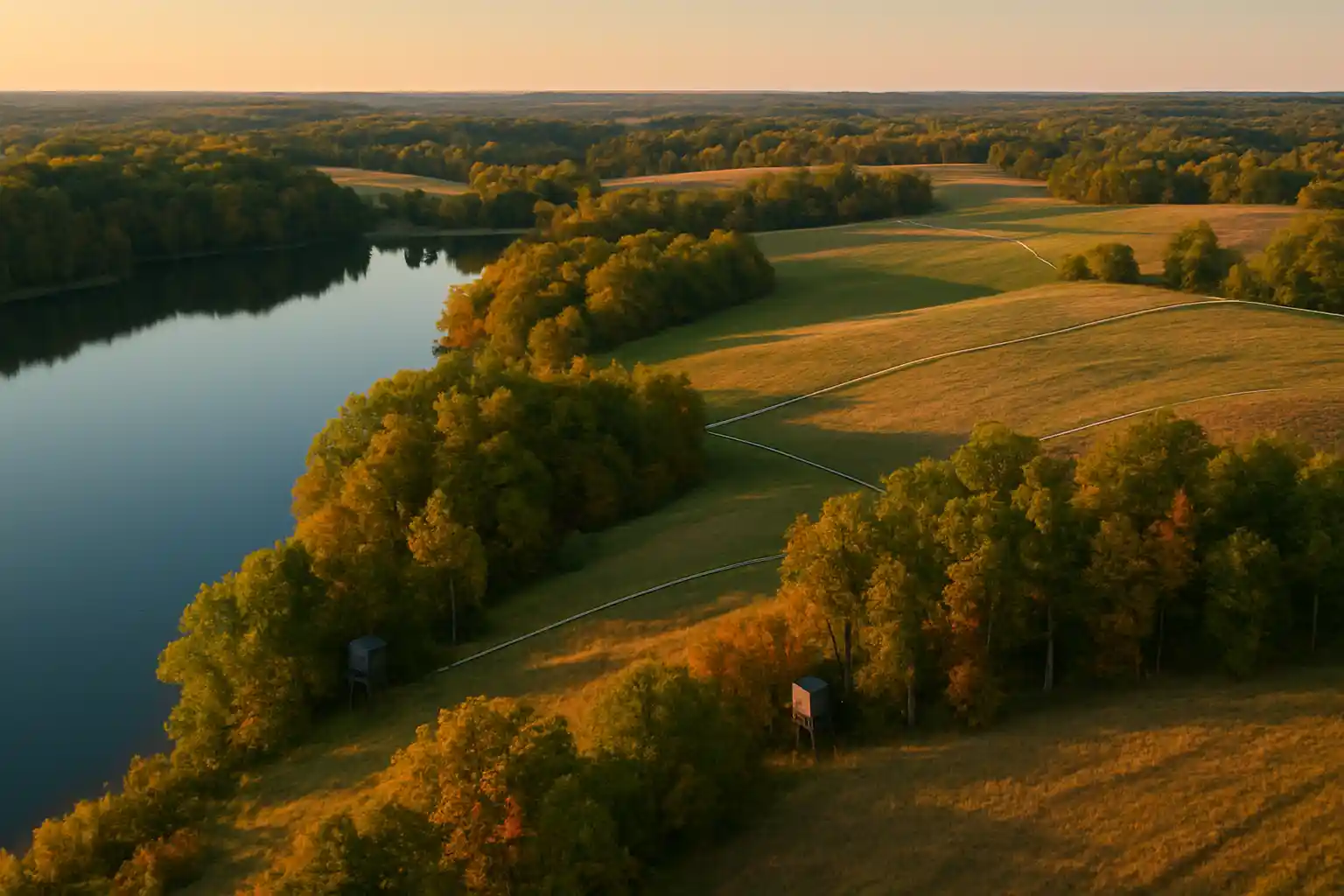
Understanding the Michigan Recreational Land Market
Michigan's recreational land market is unlike anywhere else in the country. With over 11,000 inland lakes, 3,200 miles of Great Lakes shoreline, and some of the Midwest's best hunting, the Great Lakes State offers recreational property buyers an incredible variety of options. But this diversity also creates a complex market that requires specialized knowledge to navigate successfully.
What Makes Michigan Recreational Land Unique
The state's recreational property market operates on different fundamentals than traditional real estate. While residential properties focus on location and amenities, recreational land values hinge on natural features and outdoor recreation potential:
Key Value Drivers:
- Water access and quality - Frontage on pristine lakes commands premium prices
- Wildlife populations - Established deer trails and feeding areas boost hunting property values
- Timber quality and quantity - Mature hardwoods increase both hunting appeal and land value
- Accessibility - Year-round road access versus seasonal-only properties creates significant price differences
- Development potential - Properties suitable for cabins or recreational facilities attract broader buyer interest
Current Market Conditions in Michigan
Recent market analysis shows recreational properties ranging from $10,000 to $30,000 per acre, with significant variations based on specific features and location. For detailed pricing breakdowns across different regions and property types, see our analysis of Michigan hunting and recreational land prices.
Regional Market Breakdown:
- Southern Michigan - Higher prices due to proximity to major metro areas
- Northern Lower Peninsula - Balanced mix of hunting and lakefront properties
- Upper Peninsula - Larger tracts available, specialized market for remote recreational use
Understanding Recreational Property Buyers
Michigan's recreational land attracts distinct buyer categories, each with specific needs and timelines. Out-of-state buyers, particularly from Illinois, Indiana, and Ohio, represent a significant portion of the market, often seeking weekend retreats or hunting properties within driving distance of home.
Local buyers typically include established hunters looking to expand their holdings, families seeking lakefront recreation, and investors recognizing the long-term value of Michigan's natural resources. However, these buyers often face financing challenges, as traditional mortgages rarely cover raw recreational land, creating opportunities for sellers who can offer flexible terms or attract cash buyers.
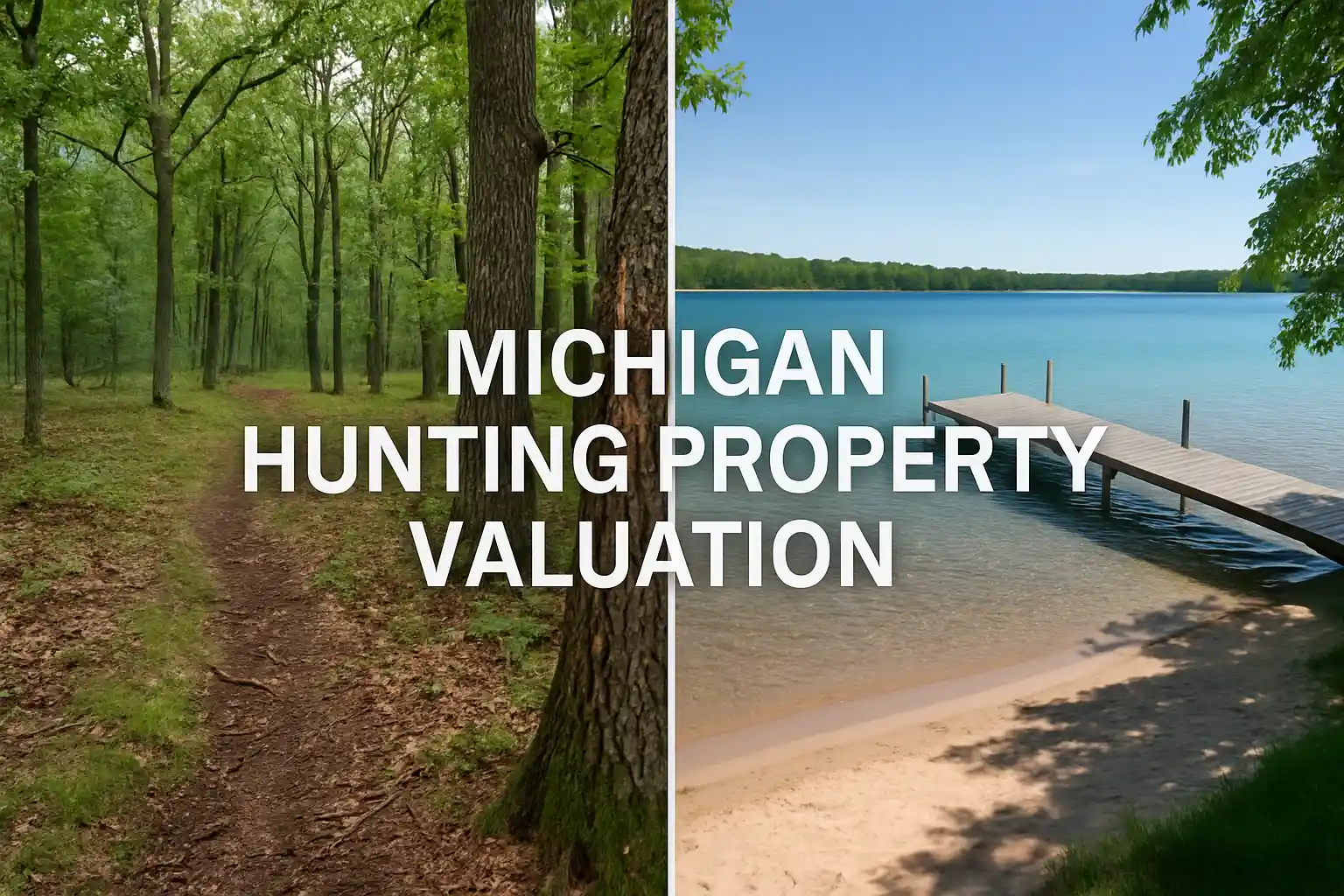
Valuing Hunting and Lakefront Property in Michigan
Determining the value of recreational land in Michigan requires understanding factors that don't apply to traditional real estate. Unlike residential properties where square footage and comparable sales drive pricing, recreational land value depends heavily on natural features, wildlife populations, and recreational potential that can vary dramatically even between adjacent properties.
Hunting Land Valuation Factors
Michigan's reputation as a premier hunting destination means hunting properties command strong values, but not all hunting land is created equal. Professional appraisers and buyers look for specific characteristics that indicate quality hunting potential and long-term value retention.
Primary Hunting Value Drivers:
- Deer population density - Properties with established travel corridors and bedding areas
- Food plot potential - Open areas suitable for wildlife management and feeding
- Water sources - Natural springs, streams, or pond sites for year-round wildlife attraction
- Timber diversity - Mix of mature hardwoods and edge habitat creates optimal hunting conditions
- Access infrastructure - Existing trails, stands, and hunting blinds add immediate value
Lakefront and Waterfront Valuations
Michigan's extensive waterfront creates a complex valuation landscape where riparian rights, water quality, and seasonal accessibility all impact property values. Lakefront properties typically command the highest per-acre prices in the recreational market, but values vary significantly based on specific lake characteristics.
Waterfront Valuation Elements:
- Frontage quantity and quality - Linear feet of water access directly correlate to value
- Water depth and clarity - Deep, clear water supports better fishing and recreation
- Shoreline condition - Sandy beaches command premiums over rocky or marshy shores
- Lake size and usage - Larger lakes with motor boat access are typically worth more than small fishing ponds
- Development restrictions - Zoning and environmental regulations can limit or enhance value
Understanding Michigan's Conservation Programs
Several state and federal programs can significantly impact recreational property values, either positively through tax benefits or negatively through use restrictions. Michigan's Commercial Forest Program offers reduced property taxes for qualifying timber properties, while the Qualified Forest Program provides additional tax advantages for larger forest holdings.
These programs can reduce annual carrying costs by thousands of dollars, making properties more attractive to buyers. However, enrollment requirements and withdrawal penalties must be carefully considered when valuing enrolled properties.
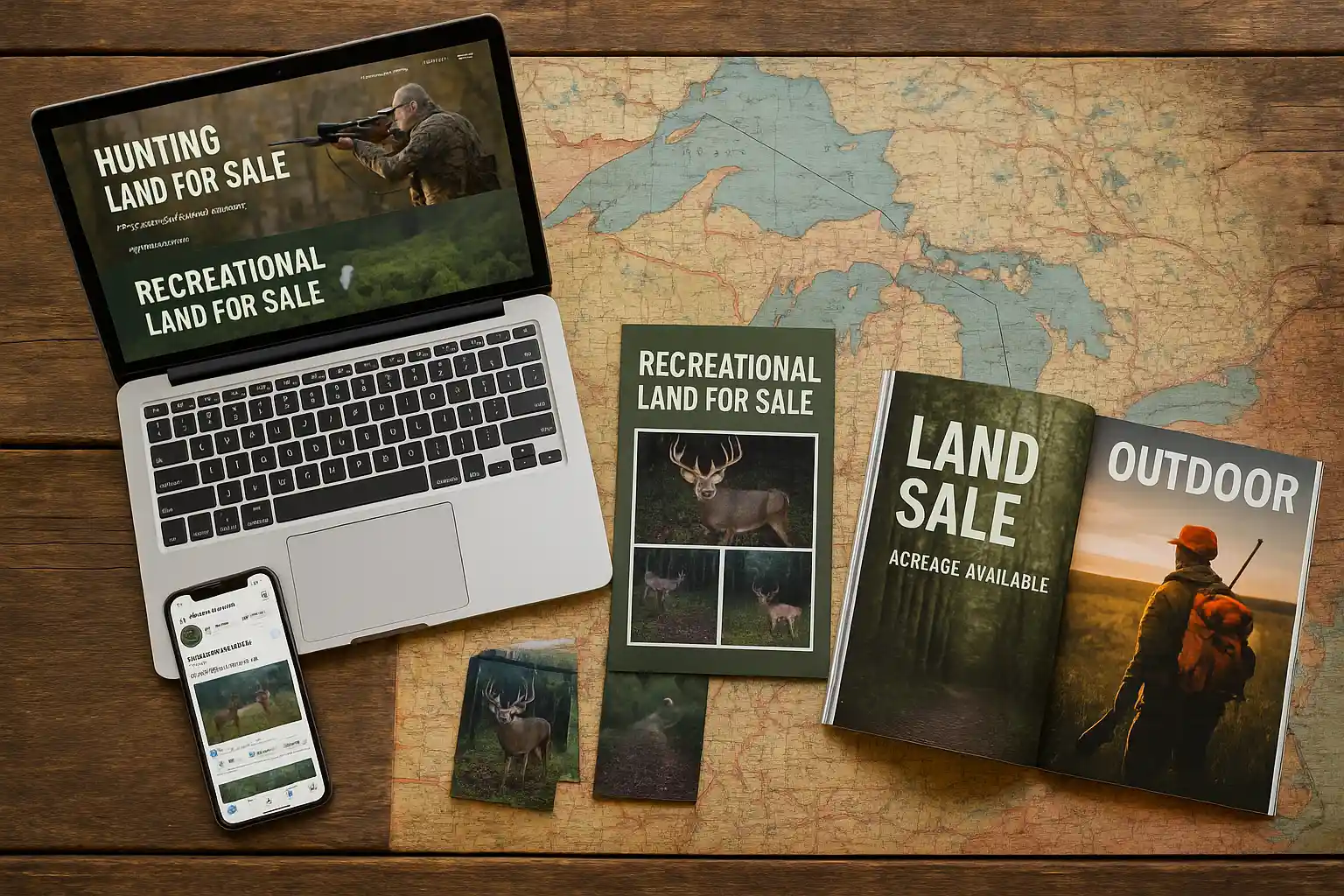
Marketing Recreational Land: Reaching the Right Buyers
Marketing recreational property requires a fundamentally different approach from selling residential real estate. Your ideal buyer isn't browsing general real estate websites—they're hunting enthusiasts researching deer populations, anglers looking for pristine fishing spots, or families seeking the perfect lakefront retreat. Successfully selling recreational land means reaching these specialized buyers where they spend their time and speaking their language.
Understanding Your Buyer Demographics
Michigan's recreational land attracts distinct buyer segments, each with specific motivations and search behaviors. Out-of-state buyers from Illinois, Indiana, and Ohio represent a significant portion of the market, often seeking hunting properties within a reasonable drive from home. Local buyers include established hunters expanding their holdings, families wanting lakefront recreation, and investors recognizing recreational land's long-term value.
Primary Buyer Categories:
- Serious hunters - Focus on deer populations, access trails, and hunting infrastructure
- Fishing enthusiasts - Prioritize water quality, fish species, and boat access
- Family recreation buyers - Seek properties suitable for cabins, camping, and outdoor activities
- Investment buyers - Look for properties with timber value or development potential
- Adjacent landowners - Neighbors wanting to expand existing recreational holdings
Specialized Marketing Channels for Recreational Properties
Traditional MLS listings reach general real estate buyers, but recreational properties require targeted marketing to outdoor enthusiasts. Specialized hunting and fishing websites, outdoor magazines, and recreational land brokerages connect you with buyers specifically seeking properties like yours.
Effective Marketing Platforms:
- Hunting-focused websites - WhitetailProperties.com, RecLand.net, and similar platforms
- Outdoor magazines - Both print and digital publications targeting hunters and anglers
- Social media groups - Facebook hunting and fishing communities, especially state-specific groups
- Sporting goods stores - Bulletin boards and word-of-mouth in areas with high hunter traffic
- Land auction companies - Specialized auctioneers familiar with recreational property values
Creating Compelling Property Presentations
Recreational buyers want to see more than basic property photos. They need evidence of wildlife activity, water quality assessments, aerial views showing property layout, and documentation of any hunting or fishing success on the property. Professional photography should showcase the property during peak seasons when natural features look their best.
Essential Marketing Materials:
- Trail camera photos - Document deer populations and wildlife activity patterns
- Aerial photography - Show property boundaries, water features, and access routes
- Topographic maps - Highlight elevation changes, drainage patterns, and potential food plot locations
- Water testing results - For lakefront properties, provide clarity and fish population data
- Infrastructure documentation - Photos of existing stands, trails, docks, or recreational facilities
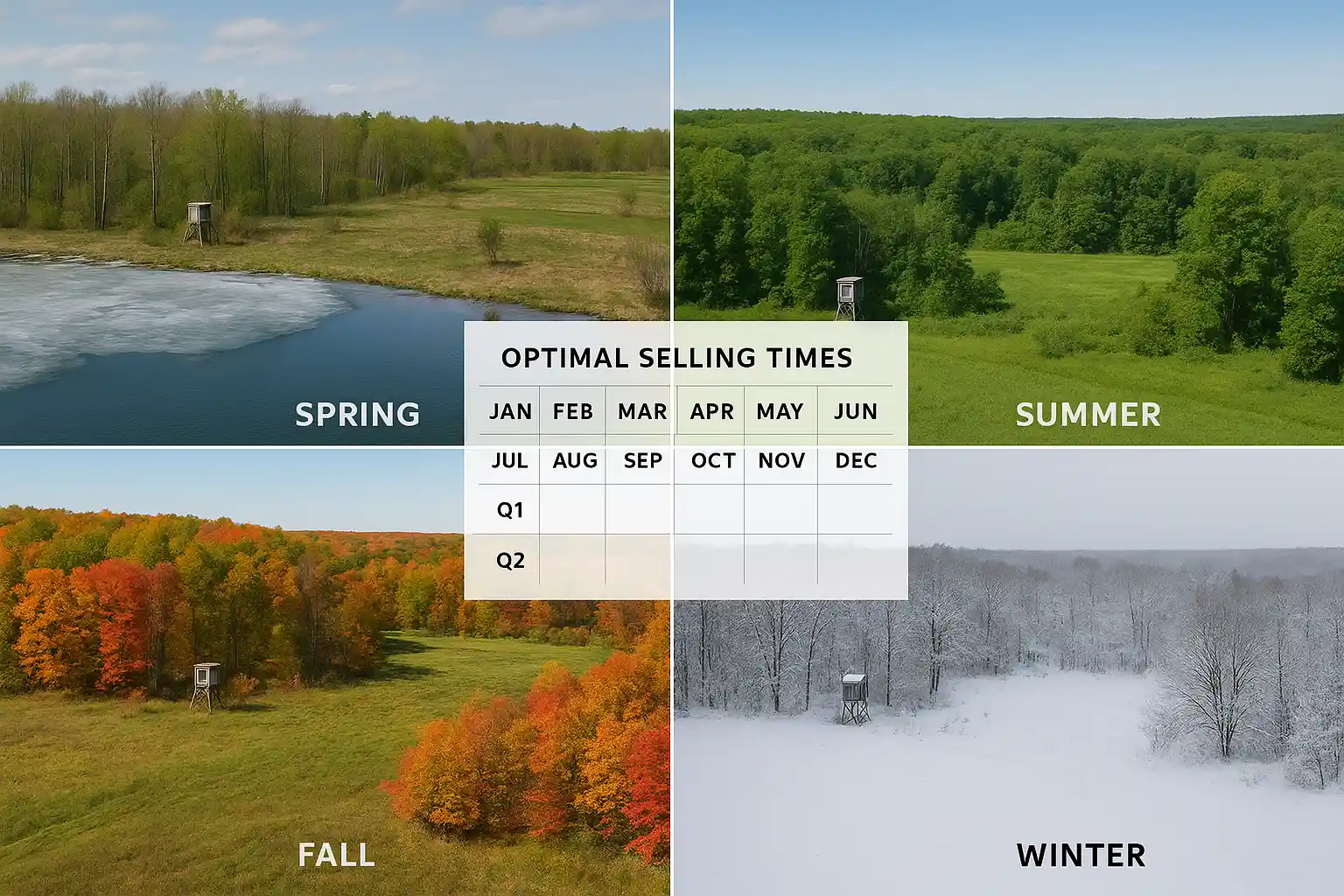
Seasonal Timing for Michigan Recreational Property Sales
Michigan's distinct seasons create clear patterns in recreational property interest, making timing crucial for successful sales. Unlike residential real estate, where buyers shop year-round, recreational property buyers follow predictable seasonal cycles tied to hunting seasons, summer recreation, and outdoor activity patterns.
Hunting Property Sales Calendar
Hunting properties follow Michigan's deer seasons, which for 2025 include the Liberty Hunt on September 13-14, Early Antlerless Firearm season September 20-21, and the main Independence Hunt October 16-19. Archery season extends through January 31, 2026, in select counties including Kent, Oakland, and Macomb.
Optimal Hunting Property Marketing Timeline:
- July-August - Peak interest as hunters scout for fall season properties
- September-October - Maximum buyer activity but limited property showings during active hunting
- November-December - Reduced activity during prime hunting season
- January-March - Post-season evaluation period, buyers assess hunting success
- April-June - Planning period for next season, good for serious buyers
Lakefront Property Seasonal Patterns
Michigan's lakefront properties peak during warm weather months when buyers can fully appreciate water access, shoreline quality, and recreational potential. Ice-covered lakes hide crucial features like water clarity, depth, and shoreline conditions that drive property values.
Lakefront Marketing Advantages by Season:
- May-August - Prime showing season with accessible water features
- September-October - Fall colors enhance property appeal, weather still favorable
- November-April - Challenging conditions limit property access and appeal
- Ice-out timing - Early spring lake access creates initial buyer interest
Weather and Access Considerations
Michigan's winter conditions create significant challenges for recreational property sales. Snow-covered access roads become impassable, hiding property boundaries and key features. Many recreational properties rely on seasonal roads or trails that become unusable during the winter months, making property showings difficult or impossible.
Seasonal Access Challenges:
- Winter road conditions - Unplowed seasonal roads prevent property access
- Snow cover - Hides property boundaries, water features, and terrain characteristics
- Hunting season conflicts - Active seasons limit showing opportunities
- Ice safety concerns - Frozen lakes create liability issues for property tours
- Mud season - Spring thaw creates temporary access problems
Strategic Timing for Different Property Types
The ideal selling season varies significantly based on your property's primary recreational appeal. Pure hunting properties benefit from late summer marketing when hunters actively seek new locations. In contrast, lakefront properties should hit the market during spring ice-out when water features become visible and accessible.
Property-Specific Timing Strategies:
- Deer hunting land - List in July for August-September buyer peak
- Lakefront recreation - Launch marketing at ice-out for summer buyer season
- Multi-use properties - Target late spring for year-round recreational appeal
- Timber properties - Fall timing showcases mature timber and hunting potential
- Remote wilderness - Summer access allows buyers to reach and evaluate the property
Understanding these rhythms helps sellers maximize exposure and negotiate from positions of strength. For deeper insights into how seasonal patterns affect pricing and demand, explore current Michigan recreational land market trends.

Common Challenges Selling Hunting and Recreational Land in Michigan
Selling recreational property in Michigan presents unique obstacles that don't exist in traditional real estate transactions. From limited buyer pools to complex regulations, recreational land sales require specialized knowledge and patience.
Limited and Specialized Buyer Pool
Unlike residential properties that appeal to broad demographics, recreational land attracts particular buyers with particular requirements. This creates a much smaller pool of qualified prospects, extending marketing periods and requiring targeted outreach efforts that general real estate agents often struggle to execute effectively.
Buyer Pool Limitations:
- Geographic constraints - Most buyers want properties within driving distance of home
- Activity-specific requirements - Hunters need different features than fishing enthusiasts
- Seasonal interest patterns - Buyer activity concentrated in specific months
- Experience requirements - Many buyers want established hunting or fishing success history
- Budget variations - Wide range in what buyers can afford based on intended use
Financing Challenges and Cash Requirements
Traditional mortgage lenders rarely finance raw recreational land, creating significant barriers for many potential buyers. Banks view undeveloped recreational property as high-risk investments, requiring substantial down payments (often 50% or more) and charging higher interest rates when financing is available at all.
Common Financing Obstacles:
- Limited lender participation - Most banks avoid recreational land loans
- High down payment requirements - 50-70% down payments are standard when available
- Shorter loan terms - Recreational land loans typically 10-15 years maximum
- Higher interest rates - Premium rates reflect perceived lending risk
- Strict qualification criteria - Income and credit requirements exceed residential standards
Regulatory Complexity and Legal Issues
Michigan's recreational properties often involve complex legal considerations, including riparian rights, conservation program enrollment, timber harvesting regulations, and zoning restrictions. These complications can delay closings and require specialized legal expertise that increases transaction costs.
Regulatory Challenges:
- Riparian rights documentation - Waterfront properties require clear water access rights
- Conservation program implications - Enrollment may restrict property use or require withdrawal penalties
- Wetlands regulations - Environmental restrictions can limit development or use options
- Access easement issues - Landlocked properties need legal access documentation
- Zoning compliance - Recreational use restrictions vary by municipality
Valuation and Pricing Difficulties
Determining accurate market values for recreational properties requires specialized expertise that many appraisers lack. Standard residential comparable sales don't apply to hunting land or lakefront properties, leading to pricing challenges that can stall negotiations or prevent sales entirely.
Valuation Complications:
- Limited comparable sales - Few truly similar recreational properties sell annually
- Subjective value factors - Wildlife populations and hunting success are difficult to quantify
- Seasonal access limitations - Winter conditions prevent proper property evaluation
- Specialized features - Unique amenities like established food plots or fishing structures hard to value
- Market timing sensitivity - Values fluctuate based on seasonal buyer demand
Extended Marketing Timeframes
Recreational properties typically require 18-24+ months to sell, significantly longer than residential real estate's average 60-90 days. This extended timeline creates carrying cost pressures and requires sustained marketing efforts that many property owners find challenging to maintain.
Timeline Extension Factors:
- Seasonal showing limitations - Weather restricts property access for months
- Buyer decision complexity - Recreational purchases involve more evaluation time
- Financing delays - Limited lending options slow buyer qualification
- Specialized inspections - Environmental assessments and surveys take additional time
- Multiple interested parties - Family recreational purchases often involve group decision-making
Maintenance and Carrying Costs
Unsold recreational properties continue generating expenses, including property taxes, insurance, and maintenance costs. Michigan's Commercial Forest Program and Qualified Forest Program can reduce tax burdens for qualifying properties, but enrollment requirements and withdrawal penalties add complexity to sales transactions.
These challenges explain why many recreational property owners eventually turn to cash buyers who specialize in hunting and lakefront land. Cash buyers understand recreational property values, can close quickly without financing delays, and have experience navigating the regulatory complexities that often complicate traditional sales.
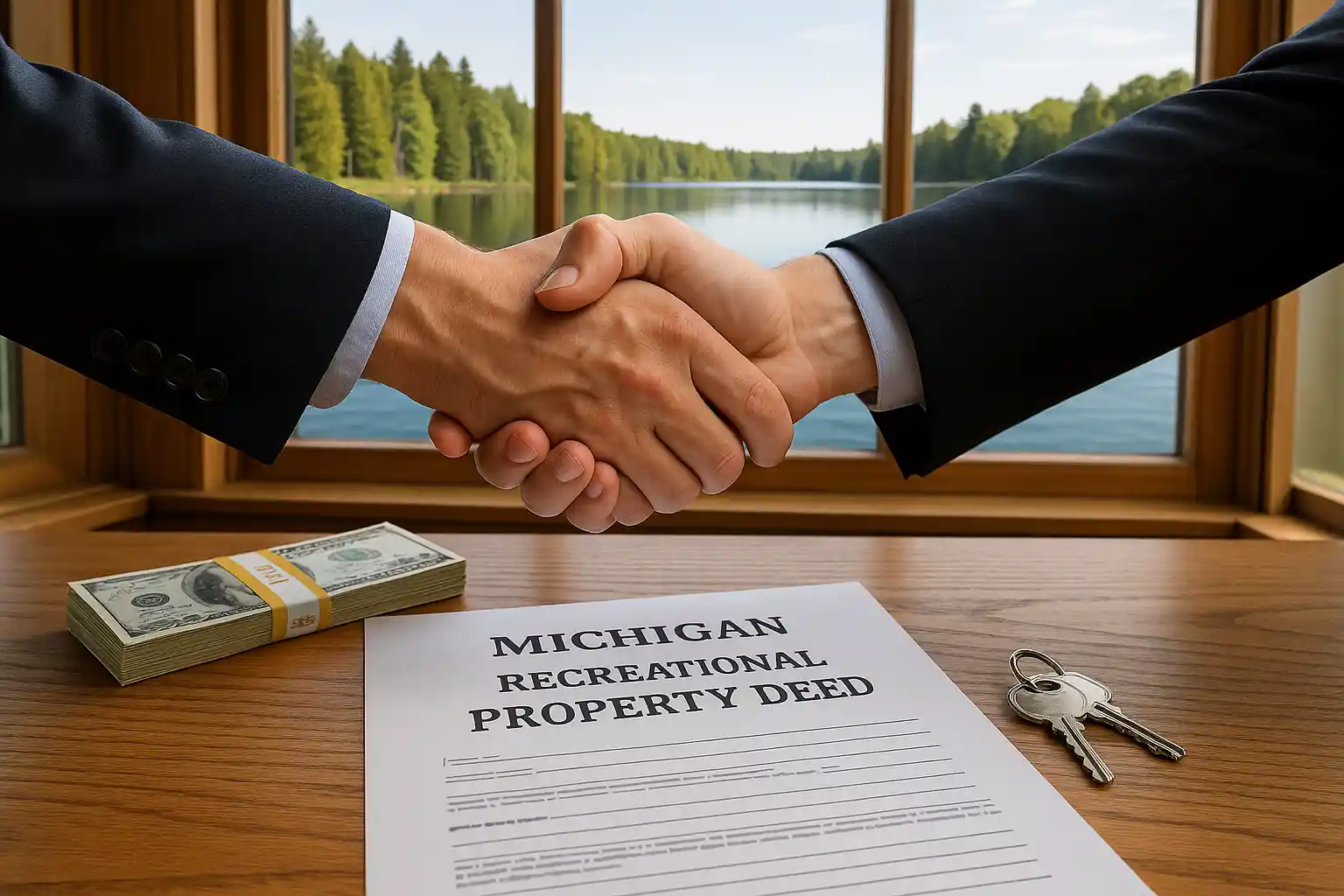
Why Cash Buyers Excel at Hunting and Recreational Land Sales
The complexities of selling recreational land in Michigan make cash buyers increasingly attractive to property owners seeking efficient, hassle-free transactions. While traditional sales through real estate agents can drag on for 18-24+ months with uncertain outcomes, cash buyers specializing in hunting and lakefront properties offer distinct advantages that address the unique challenges of recreational land sales.
Eliminating Financing Obstacles
The financing challenges that plague recreational property sales disappear completely with cash transactions. Traditional buyers struggle to secure loans for raw land, facing high down payments, short loan terms, and strict qualification requirements. Cash buyers eliminate these barriers, creating certainty for sellers who need to close on specific timelines.
Financing Advantages:
- No loan approval delays - Offers don't depend on bank underwriting processes
- No appraisal requirements - Cash buyers conduct their property evaluations
- Faster closing timelines - Complete transactions in 3-4 weeks versus months
- No financing contingencies - Offers remain firm regardless of lending market conditions
- Simplified documentation - Avoid extensive financial paperwork and verification
Streamlined Transaction Process
The complexity of recreational land sales—from title searches involving water rights to conservation program documentation—becomes manageable with experienced cash buyers who handle these transactions regularly. They work with title companies familiar with recreational land issues and can navigate closing requirements efficiently.
Process Advantages:
- Experienced closing teams - Work with professionals familiar with recreational land transactions
- Simplified paperwork - Handle complex documentation requirements professionally
- Title issue resolution - Address access easements and boundary questions efficiently
- Conservation program coordination - Manage enrollment transfers or withdrawal requirements
Why Prime Land Buyers Is Your Best Choice for Michigan Recreational Property
Look, we get it. Selling recreational land can feel overwhelming, especially when you're dealing with inherited hunting property you don't use, lakefront land that's become a financial burden, or simply wanting to cash out of a recreational investment that no longer fits your lifestyle.
That's exactly why we started Prime Land Buyers. We've helped many landowners turn their recreational properties into cash quickly, without the headaches of traditional real estate sales. No waiting 18+ months for the "right buyer." No dealing with financing fall-throughs from buyers who can't get approved for recreational land loans.
Here's what makes us different:
- We understand recreational value - We evaluate deer sign, timber quality, and water access rights, not just generic price-per-acre
- Lightning-fast closings - Cash in your hands within two weeks, no financing delays or seasonal restrictions
- We handle the complexities - All paperwork, conservation programs, and riparian rights issues taken care of for you
Ready to skip the traditional sale headaches and get your cash fast? You can sell land in Michigan for cash with a team that specializes in exactly these types of properties. Let's get you the cash you need without the typical 18-24-month wait that comes with recreational property sales.

